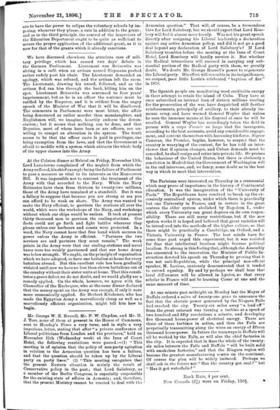At the Colston dinner at Bristol on Friday, November 13th,
Lord Lansdowne complained of the neglect from which the Army suffered, his chief example being the failure of Parliament to pass a measure so vital to its interests as the Manoeuvres Bill. It was impossible not to contrast the treatment of the Army with that accorded to the Navy. While the Navy Estimates have risen from thirteen to twenty-two millions, those of the Army have remained at a standstill. But it was a fallacy to suppose that because you are strong at sea you can afford to be weak on shore. The Army was wanted to make the Navy efficient, to garrison the stations all over the world, which were the workshops of the Navy, and workshops without which our ships would be useless. It took at present thirty thousand men to garrison the coaling-stations. Our fleets could not go forth and fight battles wherever they please unless our harbours and coasts were protected. In a word, the Navy cannot have that free hand which secures its power unless the Army is efficient. " Partners the two services are and partners they must remain." The weak points in the Army were that our coaling-stations and naval bases were too weakly garrisoned and that our home Army was below strength. We ought, on the principle of organisation which we have adopted, to have one battalion at home for every battalion abroad. But this excellent rule has been gradually violated until now we have no less than eleven battalions out of the country without their sister units at home. That this consti- tutes a grave defect we do not doubt, and we would gladly see a remedy applied. On the whole, however, we agree with the Chancellor of the Exchequer, who at the same dinner declared that the money spent on the Army was enough, if only it were more economically applied. Sir Herbert Kitchener, who has made the Egyptian Army a marvellously cheap as well as a marvellously efficient organisation, might tell him how to begin.






















































 Previous page
Previous page